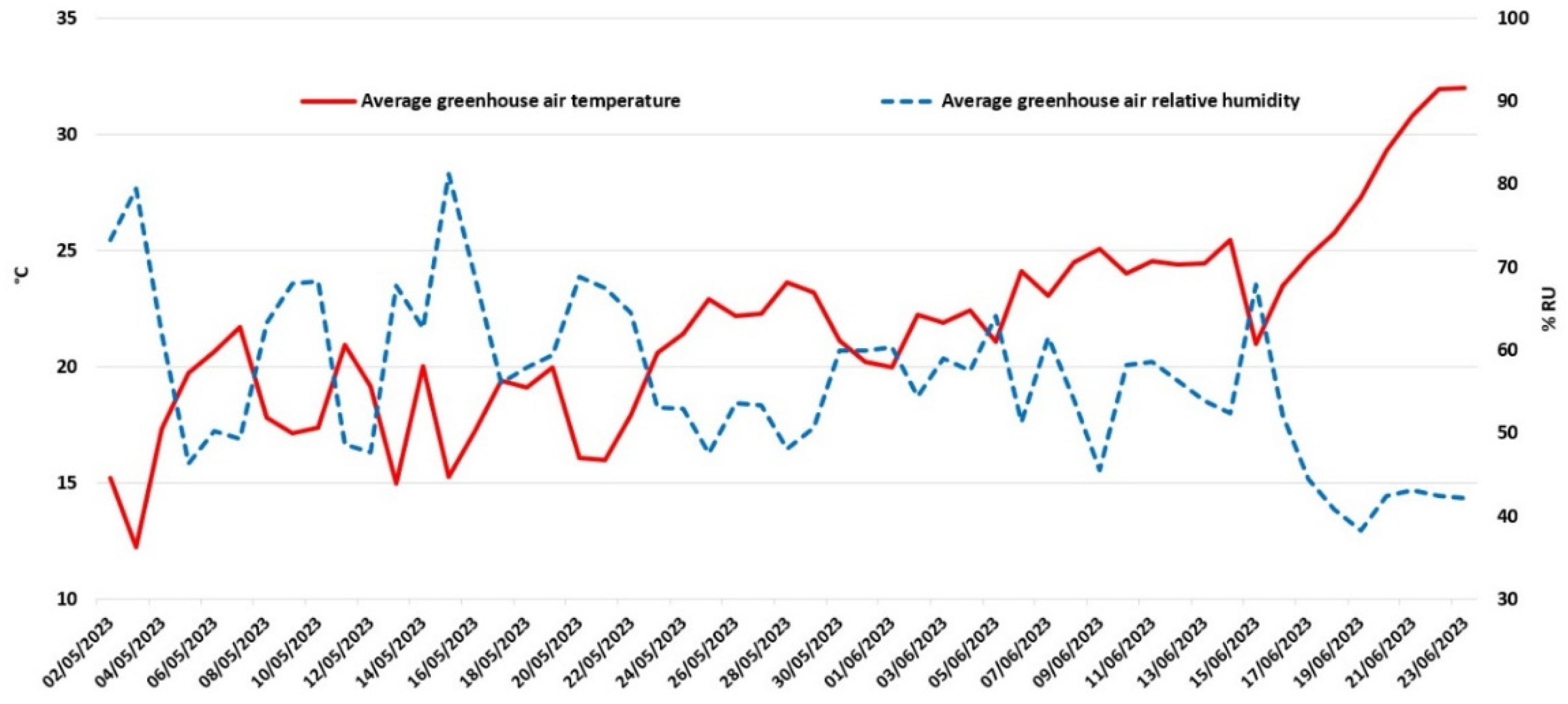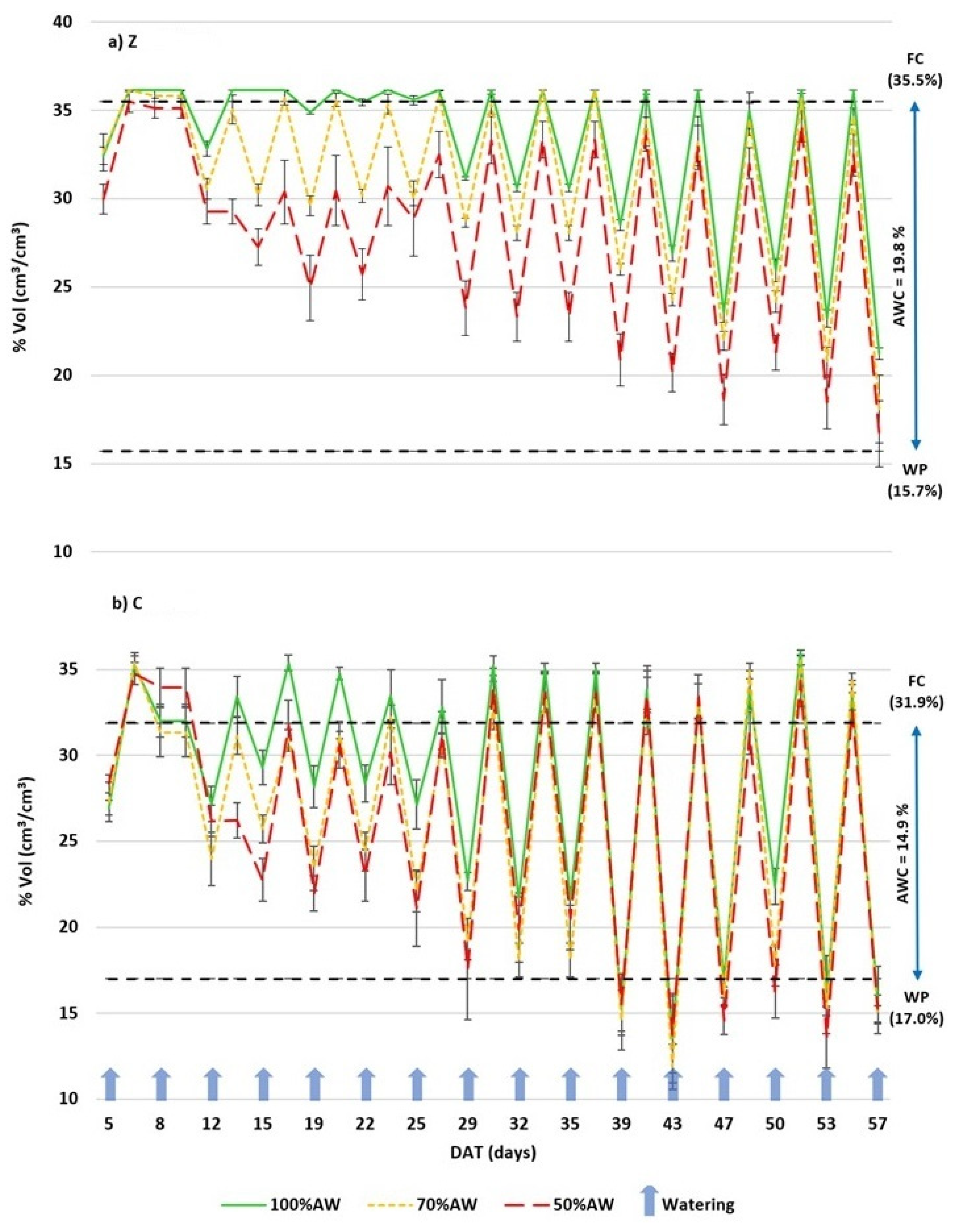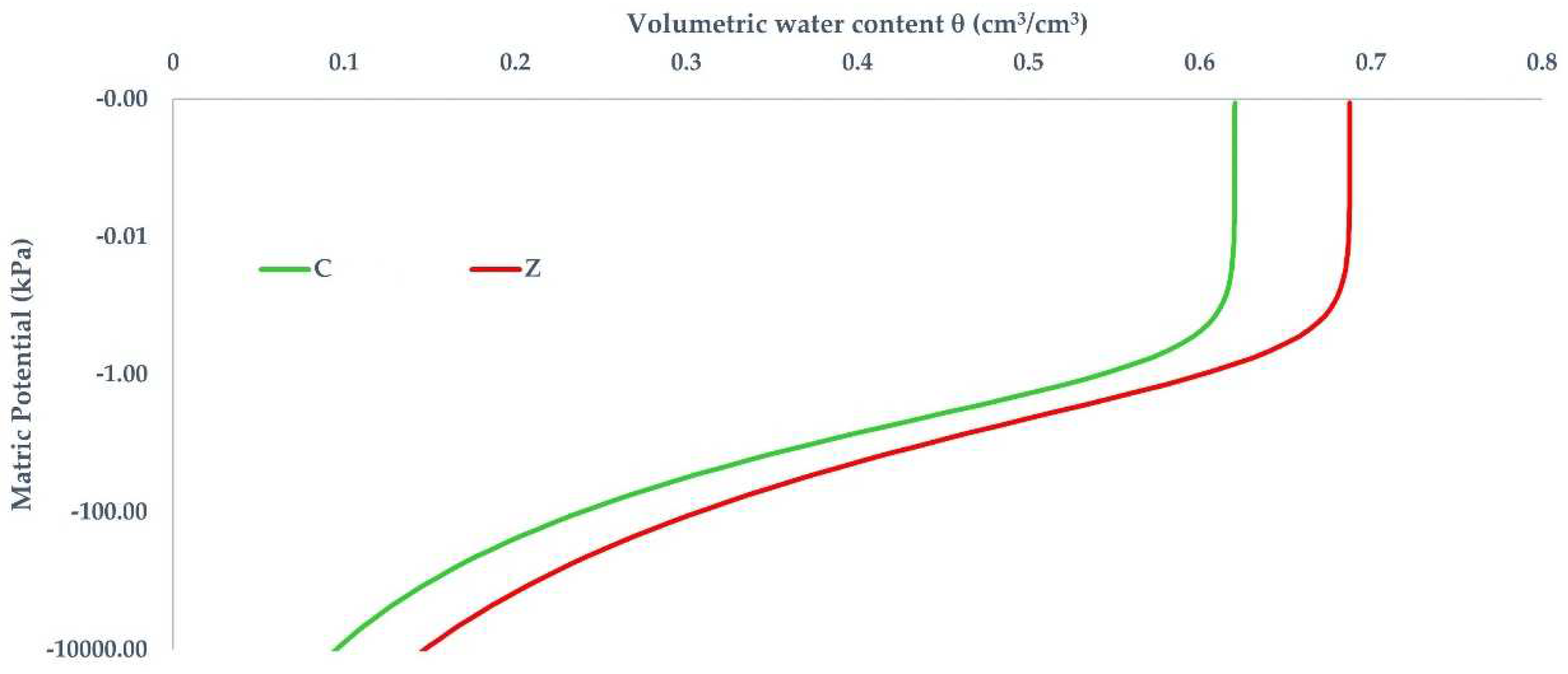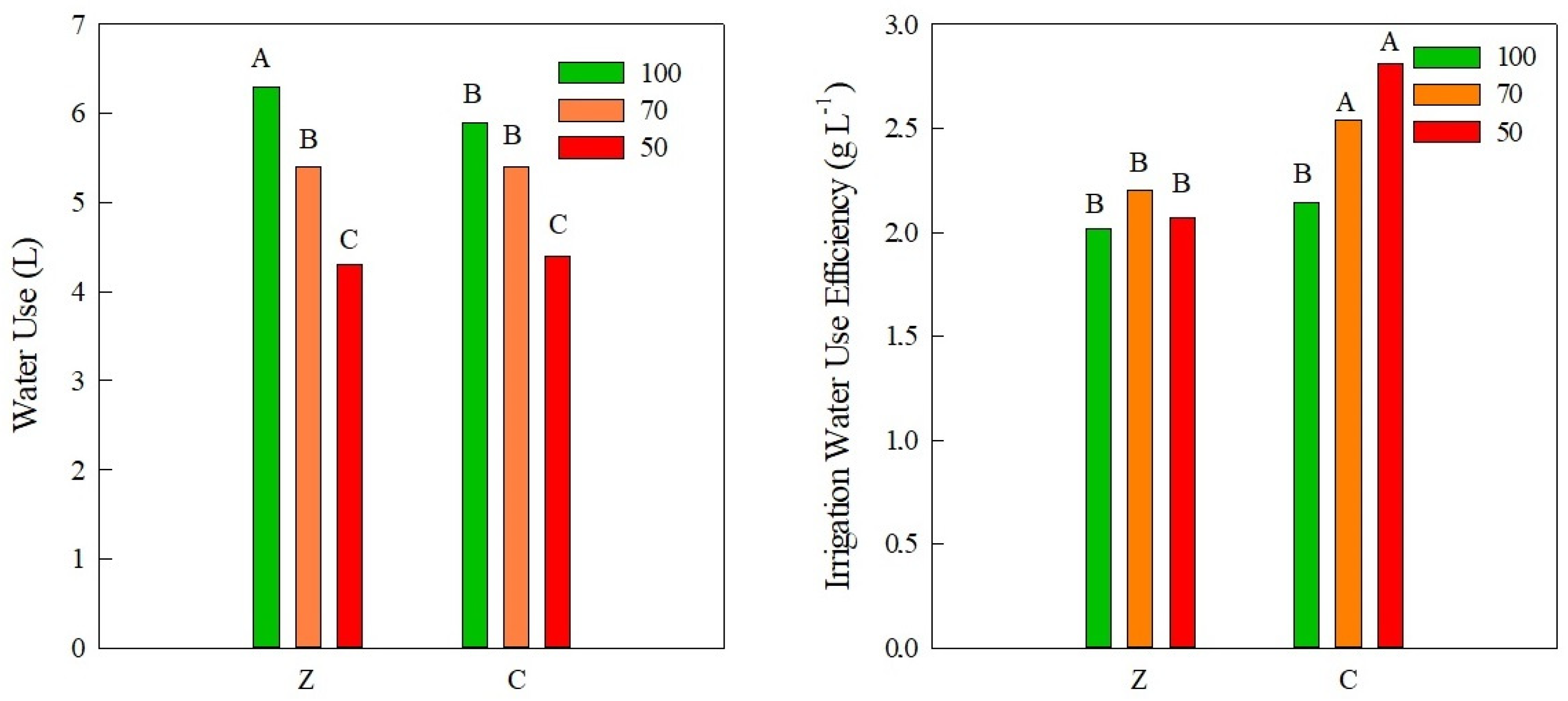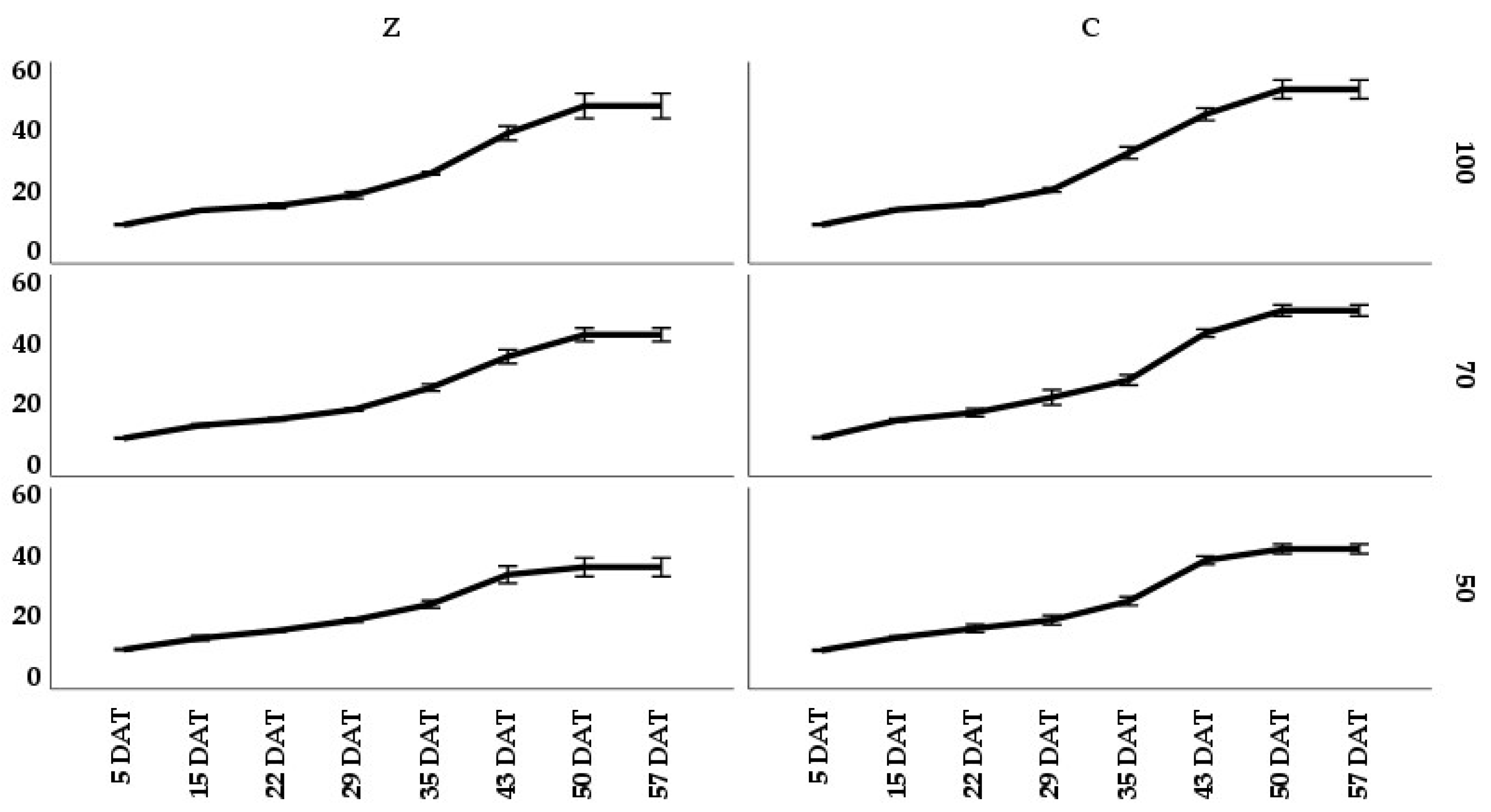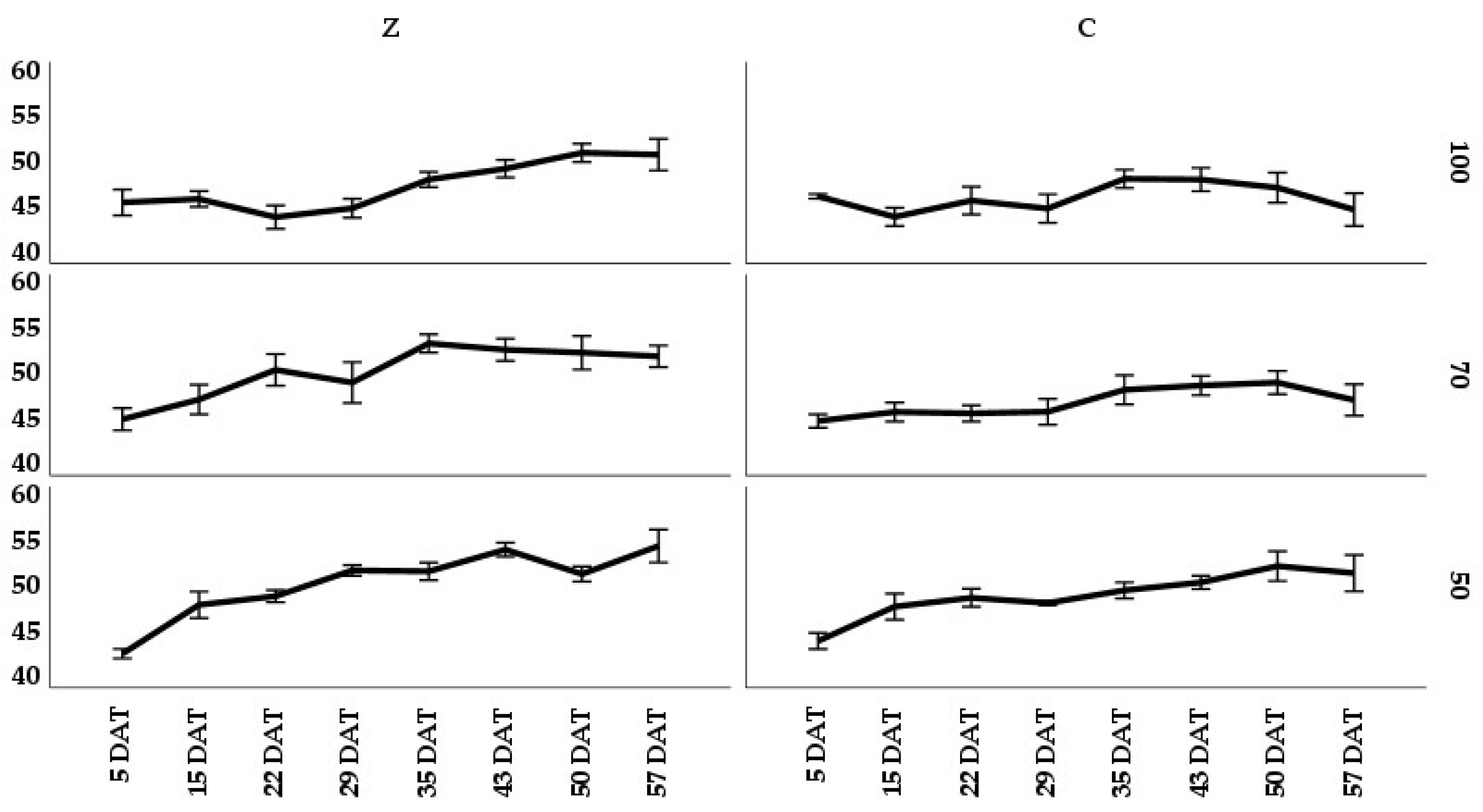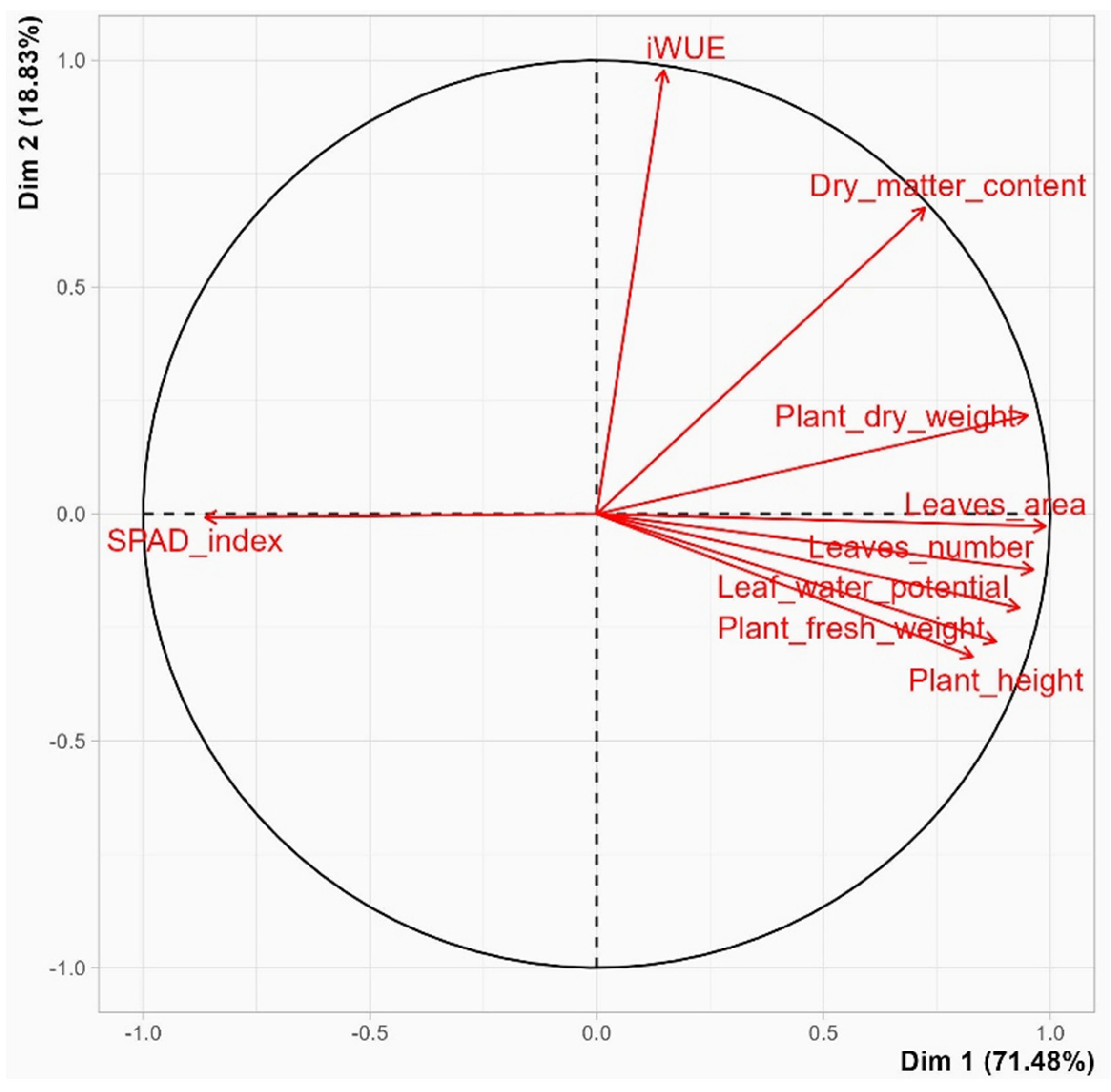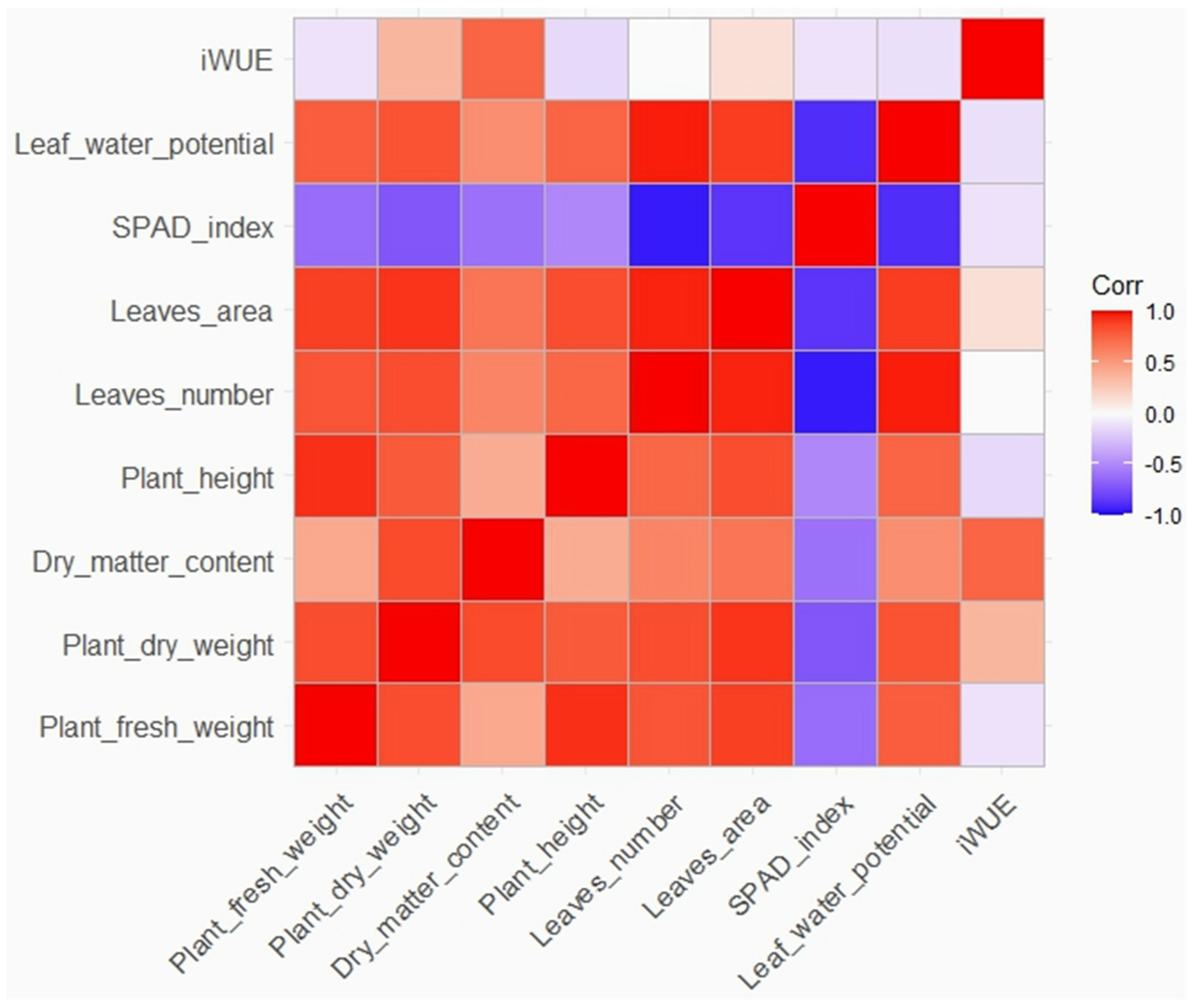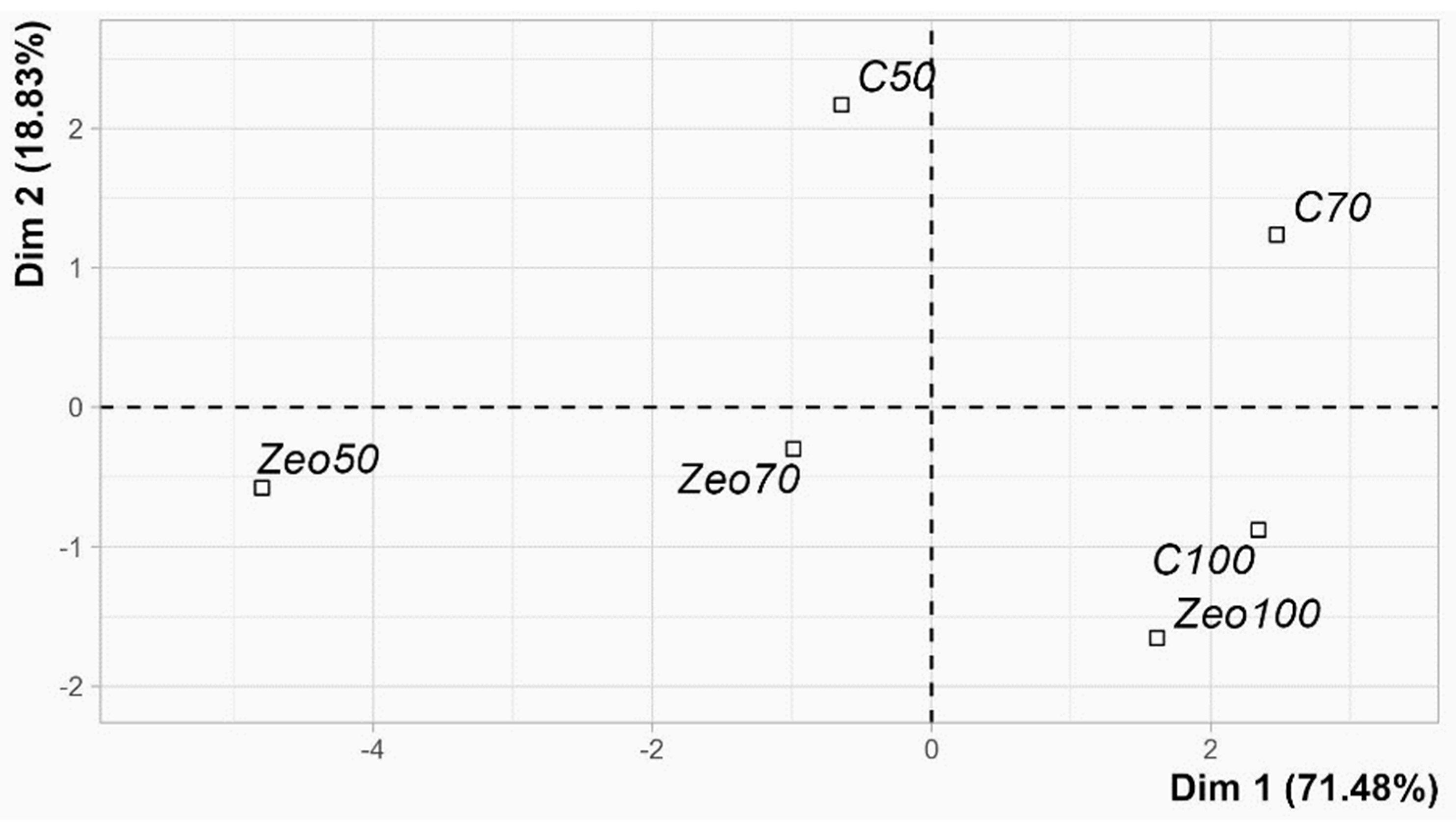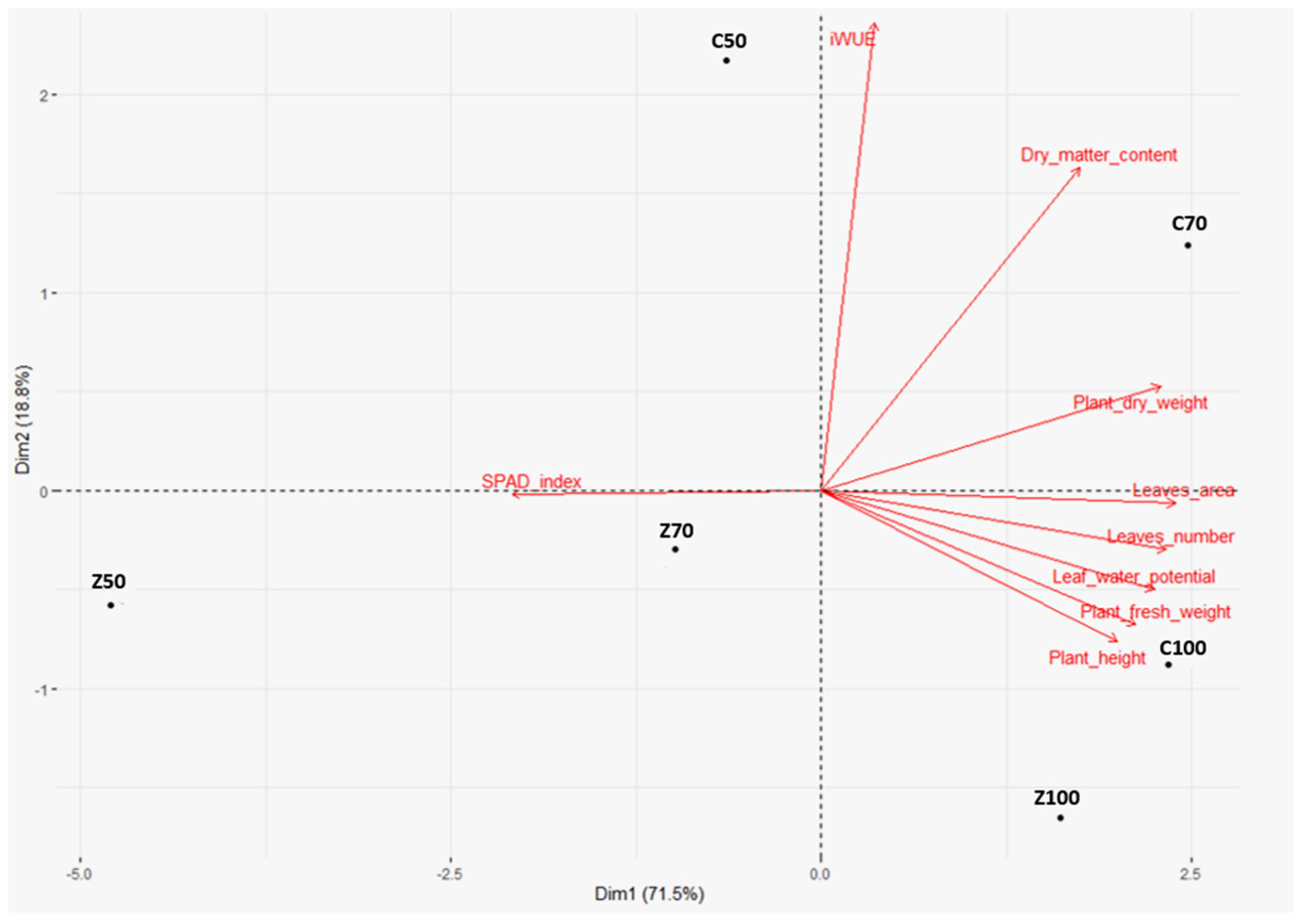1. Introduction
One of the main objectives of modern agriculture is to adopt agronomic practices that are as sustainable as possible [
1] in order to obtain healthy soils and to safe water. In this framework, the use of soil amendments together with the practice of deficit irrigation practices can play a key role because they allow to adequately modify the hydro physical properties of the cultivated soils and contribute to safe water. The availment of zeolite in agriculture as a soil conditioner has been studied by several researchers [
2,
3,
4,
5] since its usage solves various soil management problems during crop cultivation.
Zeolites are a group of natural and synthetic crystalline aluminosilicates with a framework of linked TO4 tetrahedra (where T = Si, Al or others), each consisting of four O atoms surrounding a cation. The three-dimensional networks containing cavities and channels imparts to these minerals large surface area and porosity, as well as being characterized by high ion exchange capacity.
Currently, agriculture is one of the main sectors for the utilization of natural zeolites for the various positive effects they can bring to the cultivated soil [
6]. Several studies showed the positive advantages related to the use of zeolite in crop cultivation [
2]. Zeolite may be used to improve soils contaminated by heavy metals but also as a slow-release fertilizer [
7]. Zeolite improve soil habitability for root crops and may create an improved soil structure allowing for better water infiltration and water retention as fully reported by Nakhli et al. (2017) [
8] in their review and as shown recently by several other authors [
9,
10,
11]. In spite of this, the operative implementation of zeolite in agriculture requires a detailed in-depth understanding of the interaction with soil hydro physical proprieties, soil texture and irrigation management.
Water-saving practices on irrigated crop are mandatory in order to save water since farming sector consumes an enormous amount of water with an estimate of 1,300 m
3 per person per year [
12,
13]. There is a great significant increase in the amount of water needed to produce food in 2050, from 8,500 to 11,000 km
3 per year, depending on how much the farming systems will introduce innovation in irrigation management, are estimated [
13]. Deficit irrigation may be considered an innovative approach in irrigation scheduling in terms of water saving, it consists in deliberately applying a sub-optimal quantity of water during irrigation without incurring reductions in yield and at the same time increasing crop water use efficiency [
14,
15]. Several authors showed water savings from 43% to 65% under deficit irrigation with a small impact on yield and with higher crop quality [
16]. Deficit irrigation (DI) strategy may be applied in several forms. Although the traditional one is based on the application of a sub-optimal amount of water throughout the crop cycle, other approaches are characterized by DI just in some stages of the crop cycle (Time-space deficit irrigation, TSDI) [
17], by the partial root drying (PRD) technique, and recently by the alternate wetting and drying regime (AWD) [
18].
Sweet pepper (
Capsicum annuum L.) is one of the most widespread vegetable crop in the world, being part of the top ten cultivated vegetable crops worldwide, with a very important economic value [
19,
20,
21]. Its fruits are particularly appreciated, especially for sale in fresh markets because of its color, pleasant flavor and high ascorbic acid and mineral content [
22,
23]. Nevertheless, application of deficit irrigation in pepper may be problematic as reductions in yield and fruit quality were observed [
24,
25] . However, other studied showed a positive impact of deficit irrigation on pepper fruit quality [
20]. Recently some authors [
14] have highlighted the need for an integrated approach involving different agronomic practices with deficit irrigation strategy to further improve the potential of this innovative technique. Hence the use of zeolite as soil conditioner in combination with deficit irrigation strategy can prove to be a valid possibility in order to save water and increase water use efficiency on this crop [
20].
This study aimed to verify the combined effects of zeolite added to the sandy loam soil and deficit irrigation management on soil water uptake and growth of sweet pepper.
2. Materials and Methods
2.1. Experimental description and experimental design
To study the effect of both zeolite synthesized from coal fly ash and deficit irrigation on sweet pepper (
Capsicum annuum L. cv ‘Alceste F1’ by Orto Mio S.r.l., Forlì, Italy), an experiment was conducted at the University of Basilicata, Italy, 40°31’51’’N, 15°48’35’’E; 736 m a.s.l.) in a temperature-controlled glasshouse. Polypropylene plastic pots having a conical trunk shape (20.0 cm high, 17.0 cm lower diameter, 20.0 cm upper diameter) with a volume of 7 liters were used to cultivate the sweet pepper plants. Pots were filled with a sandy-loam soil, collected in a field located in the Basilicata Region Southern Italy (40°24’45” N, 16°46’44” E; 44 m a.s.l.), air-dried and passed through a 2-mm sieve to which zeolite was added. Both soil and zeolite used in the trial were previously characterized by Comegna et al. (2023) [
10], as shown in
Table 1. The synthesis of zeolite employed in the experiment has been performed by a pre-fusion hydrothermal process at 60 °C [
26,
27] and the final product was Ca-exchanged [
28]. The experiment was planned in order to have two main treatments consisted of 1) soil with zeolite at 2% (Z) and 2) soil without zeolite, as control (C), and three subplot treatments consisted of 1) full irrigation at 100% of available water content (AWC) (100); 2) DI at 70% of AWC (70); 3) DI at 50% of AWC (50). Therefore, a split-plot block design with six treatments, each one consisting in a single pot and with four replicates was carried out in order to have a total of 24 pots. Treatments were named Z100 (soil with zeolite at 2% and full irrigation at 100% of AWC), Z70 (soil with zeolite at 2% and DI at 70% of AWC), Z50 (soil with zeolite at 2% and DI at 50% of AWC), C100 (soil without zeolite and full irrigation at 100% of AWC), 70 (soil without zeolite and DI at 70% of AWC), and C50 (soil without zeolite and DI at 50% of AWC).
Table 2 shows the values of soil moisture at field capacity, wilting point and the different available water content of the used soil with and without zeolite as reported in a previous paper [
10].
On 24
th April 2023, the pots were irrigated to the field capacity (
Table 2), and then sweet pepper seedlings at the 3-4
th true leaf stage were transplanted to have 2 plants per pot, successively plants were reduced to have one plant per each pot. At the first irrigation when plots were brought to the field capacity, fertilization with potassium nitrate 13-46 and diammonium phosphate 18-46 with a total dose of 3 g of N plant
-1,1 g di P
2O
5 and 5 g of K
2O plant
-1 was made. During the experiment, plants were watered weekly and soil moisture content was monitored continuously by soil sensors during the trial. In fact, at the beginning of the trial, watermark probes (Watermark 200SS, The Irrometer Company, Inc., USA) were installed in all pots, particularly one watermark per repetition of each treatment. Before the trial, according to the installation and operating instructions, watermark probes undergone to preconditioning [
29] and then they were calibrated according to the methodology proposed by Abbas et al. (2011) [
30].
During the trial, to record the greenhouse air temperature and relative humidity a portable probe (Escort Junior temperature & humidity data logger, Escort Messtechnik AG, Switzerland) was used. Data were acquired every hour and the probe was kept located just over the sweet pepper canopy.
Figure 1 shows the mean air temperature and relative humidity patterns monitored throughout the experiment. From transplanting to the first fruit ripening, plants were monitored weekly by counting the leaf number and measuring plant height, moreover using a SPAD meter (SPAD-502, Konica Minolta Corporation, Ltd., Japan) the leaf greenness index values were measured.
On 23
th June, at the end of the trial, using the pressure chamber technique according to Scholander et al. (1965) [
31], the leaf water potential (Ψ) was measured on the youngest uppermost fully expanded leaf of three plants per treatment at midday. Moreover, on the same day per each treatment, leaves were counted and passed through an electronic area meter (3100 area meter, LI-Cor, Inc., Lincoln, NE, USA) to measure the leaf area. Furthermore, sweet pepper fresh and dry weight, by drying the samples in a ventilated oven at 75 °C until a constant weight was reached and humidity was determined and therefore dry matter content was calculated. Lastly, irrigation Water Use Efficiency (iWUE) was calculated as the ratio between the assimilated total dry weight (g) and the irrigation volume (g L
-1).
2.2. Statistical analysis
Before performing analysis of variance (ANOVA), Shapiro-Wilk (p ≤ 0.05) and Bartlett (p ≤ 0.05) tests were applied to test normality and homogeneity of variances, respectively. Afterward, data were subjected to the analysis of variance (two-way ANOVA) according to the split-plot experimental design, considering the “zeolite soil content” and the “water regimes”, placed in the main plots and in the sub-plots respectively, as sources of variation. Mean values were separated with the Student–Newman–Keuls (SNK) test, at the significance level of p ≤ 0.05.
Moreover, a principal component analysis (PCA), a multivariate statistical technique that is able both to extract information from a dataset and express it as a set of new variables and to retain most of the variation in the dataset, was performed to evaluate correlations between treatments with soil volumetric water content and some qualitative and quantitative traits of sweet pepper.
All statistical procedures were computed using the using the software RStudio: Integrated Development for R, version 2023.06.2 Build 561 [
32].
3. Results
3.1. Soil water content
Soil water content varied during the trial according with waterings.
Figure 2a shows the water volumetric soil content values in the three irrigation treatments in soil with zeolite. This parameter is different in the three studied treatments with higher values in the Z100 treatment and lower in the Z50 treatment, as expected. During the experiment, in all soil treatments with zeolite, soil volumetric content never dropped below the wilting point (15.7%).
Figure 2b shows the water volumetric soil content values in the three irrigation treatments in the soil without zeolite. As shown the differences between irrigation treatments are observably only in the first 30 days of the experiment. It is important to underline that in the two soil treatments the available water content range is different, accordingly with the effect of zeolite on the soil hydraulic properties (
Table 2,
Figure 3).
Figure 4 shows that the greater amount of water was applied to the Z100 treatment. Consequently, irrigation water use efficiency (iWUE) was lower in this treatment and in all the zeolite treatments, differently from what is expected for a deficit irrigation treatment (
Figure 4).
3.2. Plant growth
Table 3 reports the two-way ANOVA results on the recorded sweet pepper growth parameters. As it can be seen, no significantly differences were shown by treatments and their interactions for plant fresh weight and dry matter content whereas for the other parameters, the statistical analysis returned significant differences (
Table 3). Relatively to the plant dry weight, the greater value of plant dry weight was observed in the Z100 treatment reaching 12.83 g, whilst the lower one, equal to 8.89 g, was obtained by the Z50. In any case on this parameter there was no difference between 100 and treatments, as expected accordingly with deficit irrigation management. Plant height larger value, equal to 58.0 cm, was observed in the Z100 treatment and the lower one was obtained by Z50 with 47,5 cm. Regarding the leaf number and the leaf area zeolite effect, especially for the Z70 and Z50 treatments, was negative with a reduction of these parameters (
Table 3). On the leaf number, the penalizing effect of the zeolite is even clearer by looking at the temporal trend of this parameter (
Figure 5). Moreover, a negative interaction effect of the zeolite on SPAD index was also observed (
Table 3). SPAD index temporal trend shows the negative effect of presence of zeolite in the soil (
Figure 6). Sweet pepper water status was reduced by zeolite addition to the soil, leaf water potential was reduced in presence of 2% zeolite in the soil with respect to the control, respectively -1.26 and -1.09 MPa. The interaction of two studied treatments was significant with the more negative value in the Z50 (-1.48 MPa). While, in the control (C100), the water status was better (-0.95 MPa).
3.3. Principal component analysis
To achieve a complete evaluation of the effects zeolite soil content and watering regimes on some morphological and quantitative traits of sweet pepper, a principal component analysis (PCA) was done. By employing the PCA, nine original variables were reduced to two principal components, representing 90.31% of the total variability. In particular, the first component (PC 1) explained the 71.48% of the total variability, and the second one (PC 2) accounted for the remaining 18.83% (
Table 4). PC 1 was highly and positively correlated with plant fresh weight, plant dry weigh, plant height, leaves number, leaves area, and leaf water potential. In fact, in the loading plot (
Figure 7) these variables are placed far from the origin of the PC 1, close together and, therefore, positively correlated. Inversely, the first PC is characterized by a negative relationship with SPAD index. On the other hand, PC 2 was positively correlated with iWUE and dry matter content (
Table 4,
Figure 7).
The correlation between variables is clearly illustrated in the correlation matrix (
Figure 8). The matrix highlights the positive correlation between all variables except for SPAD index and, less markedly, for iWUE.
The score plot (
Figure 9) highlights a good separation between treatments. In particular, Z-100, C100, and C70 treatments, plotted in the positive side of the PC 1, were characterized to be more efficient for the sweet pepper investigated morphological and physiological traits. On the contrary, Z70, Z 50, and C50 treatments, located in the negative side of the PC 1, resulted less tended to be less efficient on the investigated traits. This is also confirmed by the biplot of loading and scores in which the all the loadings, but the SPAD index, are near the more efficient treatments (
Figure 10).
4. Discussion
There are numerous advantages deriving from the use of zeolite in agriculture [
2], one of these is closely linked to the ability of this material to retain large amount of water. This aspect plays an important role during periods of water scarcity, in areas where water availability is limited or water losses are substantial [
33]. In this experiment we observed the capacity of zeolite added to a sandy loam soil to widen the range of available water into the soil and to retain water although at more negative matric potential values, due to narrower pores [
10] compared to the condition of the soil without zeolite (
Table 2,
Figure 2 and
Figure 3). Soil water content values during the trial showed that, when sub-optimal irrigation water is applied (Z70 and Z50 treatments) on sandy loam soil added with 2% zeolite, water is available for sweet pepper crop but at lower matric potential (
Figure 3). These results are in agreement with Al Busaidi et al. (2008) and Ippolito et al. (2011) [
34,
35]. On sandy loam soil, the 2% of zeolite addition also improves air capacity from 29,1 to 33,3% (
Table 2) creating better soil habitability and aeration for the growth of the plant's root systems. But this improvement evidently it is not enough. The aspects mentioned highlight the complexity of the effect that the addition of zeolite can cause in a soil in relation to its texture [
9,
36] and the impact that zeolite combined with deficit irrigation management can have on the sweet pepper growth. These results on water retention in soil are consistent with other studies [
34,
37,
38,
39]. But other authors underlined that the high-water sorption by zeolite causes damage to crops as dry zeolite blocks water in its structure [
6].
However, in literature there are not information about combined effect of adding zeolite to the soil and deficit irrigation management on sweet pepper. In our experiment, sweet pepper growth with deficit irrigation strategy (Z70 treatment,
Table 3 and
Figure 3) allowed for savings in irrigation water, as expected. No benefits on irrigation water use efficiency (iWUE) deriving from the application of deficit irrigation in treatments with zeolite was observed (
Figure 4). However, it is worth underlining that the sweet pepper crop is not very suitable to deficit irrigation, as it has a yield response to water (Ky) greater than 1,0 (Ky= 1.1[
40,
41]) and the use of this irrigation strategy may be inefficient as reductions in yield and fruit quality may occur [
24,
25,
42,
43]. Hence the use of zeolite as soil conditioner in combination with deficit irrigation strategy could solve these difficulties. In our research the greater quantity of available water that the zeolite can allow to be retained in the soil does not translate into an advantage because this water is retained by narrower pores with more negative matric potential values. This means that the sweet pepper, subjected to sub-optimal irrigation, in order to limit the water loss reduces the leaf transpiration surface, having lower leaf number, leaf area, and plant dry weight (
Table 3,
Figure 6), and moreover the crop needs to allocate more resources for water uptake. The greater effort in water uptake is also confirmed by the more negative leaf water potential and higher SPAD index values that are observed in the Z treatments (
Table 3,
Figure 7). The PCA analysis briefly confirms what has just been reported, the Z100, C100, and C70 treatments, were characterized to be more efficient for the sweet pepper investigated morphological and physiological traits. Results presented here indicate that on sweet pepper the combined use of zeolite and deficit irrigation is not an effective strategy. These results disagree with other studies showing that zeolite and deficit irrigation increase yield even if on other crops [
18]. It is due on particular response of pepper to deficit irrigation and to the soil texture used in this experiment. However, the combination of zeolite and deficit irrigation management may be an innovative and effective strategy to improve water storage and increase yield in other soil texture conditions where the positive effect of adding zeolite to the soil becomes prevalent and therefore effective [
18]. In other word the results of this research suggest that the soil structural benefits resulting from the zeolite application it is not followed by an equal positive effect in terms of sweet pepper growth under deficit irrigation conditions.
5. Conclusions
Recently, there has been a great interest in using zeolite in agriculture due to the innumerable controversial effects of this soil conditioner on all the aspects that contribute to obtaining crop yield. Furthermore, as far as the deficit irrigation technique is concerned, although it has been known and studied for some years, it still needs to be used since it is a valid tool to save water. Combining zeolite and deficit irrigation management may be an innovative and effective strategy to improve water storage and increase crop yield, in soils where the positive effect of adding zeolite becomes prevalent and effective. In our experiment, the ability of zeolite added to sandy loam soil to retain water and then to widen the range of available water was observed. Sweet pepper subjected to sub-optimal irrigation reduces water use surface and, consequently, reduces crop growth. These results suggest that the soil structural benefits resulting from the studied zeolite application have a positive effect but do not follow it in terms of sweet pepper growth under deficit irrigation conditions. Further research could clarify the possibility of combining zeolite and deficit irrigation in different soil texture conditions and crops.
Author Contributions
Conceptualization, D.C., A.S., A.R.R. and S.L.; methodology, D.C., A.S., A.R.R. and S.L.; software, D.C., A.S. and S.L; validation, D.C., A.S., A.R.R., A.C. (Alessandro Comegna), C.B., A.C. (Antonio Coppola), F.C., S.D.P. and S.L.; formal analysis, D.C., A.S. and S.L.; investigation, D.C., A.S. and S.L.; resources, S.L. and A.R.R.; data curation, D.C., A.S. and S.L.; writing—original draft preparation, D.C., A.S. and S.L.; writing—review and editing, D.C., A.S., A.R.R., C.B., A.C. (Alessandro Comegna) and S.L.; visualization, D.C., A.S. and S.L.; supervision, S.L.; project administration, S.L.; funding acquisition, S.L. and A.R.R. All authors have read and agreed to the published version of the manuscript.
Funding
This research received no external funding.
Data Availability Statement
Data presented in this study are available on request from the corresponding author.
Acknowledgments
Authors thank Mr. Giuseppe Mercurio for his technical support during the trial.
Conflicts of Interest
The authors declare no conflict of interest.
References
- De Oliveira Neto, G.C.; Rodriguez Pinto, L.F.; Castro Amorim, M.P.; Giannetti, B.F.; Villas Bôas de Almeida, C.M. A framework of actions for strong sustainability. J. Clean. Prod. 2018, 196, 1629–1643. [Google Scholar] [CrossRef]
- Jarosz, R.; Szerement, J.; Gondek, K.; Mierzwa-Hersztek, M. The use of zeolites as an addition to fertilisers – A review. Catena 2022, 213, 106125. [Google Scholar] [CrossRef]
- Doula, M.K.; Elaiopoulos, K.; Kouloumbis, P.; Zorpas, A.A. In situ application of clinoptilolite to improve compost quality produced from pistachio bio-wastes. Fressen Environ. Bull. 2018, 27, 1312–1318. [Google Scholar]
- Doula, M.K.; Zorpas, A.A.; Inglezakis, V.; Navvaro Pedreno, J.; Bilalis, D.J. Optimization of heavy polluted soil from olive mill waste through the implemenation of zeoilites. J. Environ. Eng. Manage. 2019, 18, 1297–1309. [Google Scholar]
- Leggo, P.J.; Ledéser, B.; Christie, G. The role of clinoptilolite in organo-zeolitic soil systems used for phytoremediation, Sci. Total Environ. 2006, 363, 1–10. [Google Scholar] [CrossRef] [PubMed]
- Szatanik-Kloc, A.; Szerement, J.; Adamczuk, A.; Józefaciuk, G. Effect of Low Zeolite Doses on Plants and Soil Physicochemical Properties. Materials 2021, 14, 2617. [Google Scholar] [CrossRef] [PubMed]
- Papadopoulos, A.V.; Doula, M.K.; Zorpas, A.A.; Kosmidis, S.; Assimakopoulou, A.; Kolovos, C. Pepper cultivation on a substrate consisting of soil, natural zeolite, and olive mill waste sludge: changes in soil properties. Comptes Rendus. Chimie 2020, 23, 721–732. [Google Scholar] [CrossRef]
- Nakhli, S.A.A.; Delkash, M.; Bakhshayesh, B.E.; Kazemian, H. Application of Zeolites for Sustainable Agriculture: a Review on Water and Nutrient Retention. Water Air Soil Poll. 2017, 228, 464. [Google Scholar] [CrossRef]
- Belviso, C.; Satriani, A.; Lovelli, S.; Comegna, A.; Coppola, A.; Dragonetti, G.; Cavalcante, G.; Rivelli, A.R. Impact of zeolite from coal fly ash on soil hydrophysical properties and plant growth. Agriculture 2022, 12, 356. [Google Scholar] [CrossRef]
- Comegna, A.; Belviso, C.; Rivelli, A.R.; Coppola, A.; Dragonetti, G.; Sobhani, A.; di Prima, S.; Satriani, A.; Cavalcante, F.; Lovelli, S. Analysis of critical water flow and solute transport parameters in different soils mixed with a synthetic zeolite. CATENA 2023, 228, 107150. [Google Scholar] [CrossRef]
- Castronuovo, D.; Comegna, A.; Belviso, C.; Satriani, A.; Lovelli, S. Zeolite and Ascophyllum nodosum-Based Biostimulant Effects on Spinach Gas Exchange and Growth. Agriculture 2023, 13, 754. [Google Scholar] [CrossRef]
- de Fraiture, C.; Wichelns, D.; Rockstrom, J.; Kemp-Benedict, E.; Eriyagama, N.; Gordon, L.J.; Hanjra, M.A.; Hoogeveen, J.; Huber-Lee, A.; Karlberg, L. Looking ahead to 2050: scenarios of alternative investment approaches. In Water for food, water for life: a Comprehensive Assessment of Water Management in Agriculture. Molden, David (Ed.) London, UK, 2007; Earthscan; Colombo, Sri Lanka: International Water Management Institute (IWMI), pp.91-145.
- Lovelli, S. Dryland farming and the agronomic management of crops in arid environments. J. Agron. 2019, 18, 49–54. [Google Scholar] [CrossRef]
- Khapte, P.S.; Kumar, P.; Burman, U.; Kumar, P. Deficit irrigation in tomato: Agronomical and physio-biochemical implications. Sci. Hortic. 2019, 248, 256–264. [Google Scholar] [CrossRef]
- Pereira, L.S.; Oweis, T.; Zairi, A. Irrigation management under water scarcity. Agr. Water Manage. 2002, 57, 175–206. [Google Scholar] [CrossRef]
- Mirás-Avalos, J.M.; Pérez-Sarmiento, F.; Alcobendas, R.; Alarcón, J.J.; Mounzer, O.; Nicolás, E. Using midday stem water potential for scheduling deficit irrigation in mid–late maturing peach trees under Mediterranean conditions. Irrigation Sci. 2016, 34, 161–173. [Google Scholar] [CrossRef]
- Guang-Cheng, S.; Na, L.; Zhan-Yu, Z.; Shuang-En, Y.; Chang-ren, C. Growth, yield and water use efficiency response of greenhouse-grown hot pepper under Time-Space deficit irrigation. Sci. Hortic. 2010, 126, 172–179. [Google Scholar] [CrossRef]
- Wang, Y.; Chen, J.; Sun, Y.; Jiao, Y.; Yang, Y.; Yuan, X.; Erik Lærke, P.; Wu, Q.; Chi, D. Zeolite reduces N leaching and runoff loss while increasing rice yields under alternate wetting and drying irrigation regime. Agr. Water Manage. 2023, 277, 108130. [Google Scholar] [CrossRef]
- Silva, A.W.B.; da Silva, B.D.N.; da Costa, A.L.; Cézar, K.C.; Gomes, L.A.A.; de Oliveira, C.L. Planting density and yield of sweet pepper grown in an organic system. Pesquisa Agropecuária Brasileira 2021, 56, e02470. [Google Scholar] [CrossRef]
- Al-Harbi, A.R.; Obadi, A.; Al-Omran, A.M.; Abdel-Razzak, H. Sweet peppers yield and quality as affected by biochar and compost as soil amendments under partial root irrigation. Journal of the Saudi Society of Agricultural Sciences 2020, 19, 452–460. [Google Scholar] [CrossRef]
- Abdelkhalik, A.; Pascual, B.; Nájera, I.; Domene, M.A.; Baixauli, C.; Pascual-Seva, N. Effects of deficit irrigation on the yield and irrigation water use efficiency of drip-irrigated sweet pepper (Capsicum annuum L.) under Mediterranean conditions. Irrig. Sci. 2020, 38, 89–104. [Google Scholar] [CrossRef]
- Kumar, R.; Kumari, P.; Kumar, S. Effect of irrigation levels and frequencies on yield, quality and water use efficiency of capsicum grown under protected conditions. International Journal of Bio-Resource and Stress Management 2016, 7, 1290–1296. [Google Scholar] [CrossRef]
- Assimakopoulou, A.; Dimitroulia, D.; Kosmidis, S.; Doula, M.K. Growth, yield and nutrient status of pepper plants grown on a soil substrate with olive mill waste sludge and natural zeolite addition. J. Plant Nutr. 2020, 43, 629–640. [Google Scholar] [CrossRef]
- Fernández, M.D.; Gallardo, M.; Bonachela, S.; Orgaz, F.; Thompson, R.B.; Fereres, E. Water use and production of a greenhouse pepper crop under optimum and limited water supply. The Journal of Horticultural Science and Biotechnology 2005, 80, 87–96. [Google Scholar] [CrossRef]
- Mardani, S.; Tabatabaei, S.H.; Pessarakli, M.; Zareabyaneh, H. Physiological responses of pepper plant (Capsicum annuum L.) to drought stress. J. Plant Nutr. 2017, 40, 1453–1464. [Google Scholar] [CrossRef]
- Belviso, C.; Cavalcante, F.; Fiore, S. Synthesis of zeolite from Italian coal fly ash: Differences in crystallization temperature using seawater instead of distilled water. Waste Manage. 2010, 30, 839–847. [Google Scholar] [CrossRef] [PubMed]
- Belviso, S.; Cavalcante, F.; Lettino, A.; Ragone, P.; Belviso, C. Fly ash as raw material for the synthesis of zeolite-encapsulated porphyrazine and metallo porphyrazine tetrapyrrolic macrocycles. Micropor. Mesopor. Mat. 2016, 236, 228–234. [Google Scholar] [CrossRef]
- Sun, H.; Wu, D.; Guo, X.; Navrotsky, A. Energetics and structural evolution of Na–Ca exchanged zeolite A during heating. Phys. Chem. Chem. Phys. 2015, 17, 9241–9247. [Google Scholar] [CrossRef]
- Irrometer Company Inc. Available online: www.irrometer.com (accessed on 20 September 2023).
- Abbas, F.; Fares, A.; Fares, S. Field calibrations of soil moisture sensors in a forested watershed. Sensors 2011, 11, 6354–6369. [Google Scholar] [CrossRef]
- Scholander, P.F.; Hammel, H.T.; Bradstreet, E.D.; Hemmingsen, E.A. Sap pressure in vascular plants. Science 1965, 148, 339–46. [Google Scholar] [CrossRef] [PubMed]
- R Core Team. R: A Language and Environment for Statistical Computing; R Foundation for Statistical Computing: Vienna, Austria, 2023. [Google Scholar]
- Cieśla, J.; Franus, W.; Franus, M.; Kedziora, K.; Gluszczyk, J.; Szerement, J.; Jozefaciuk, G. Environmental-Friendly Modifications of Zeolite to Increase Its Sorption and Anion Exchange Properties, Physicochemical Studies of the Modified Materials. Materials 2019, 12, 3213. [Google Scholar] [CrossRef]
- Al-Busaidi, A.; Yamamoto, T.; Inoue, M.; Eneji, A.E.; Mori, Y.; Irshad, M. Effects of zeolite on soil nutrients and growth of barley following irrigation with saline water. J. Plant Nutr. 2008, 31, 1159–1173. [Google Scholar] [CrossRef]
- Ippolito, J.A.; Tarkalson, D.D.; Lehrsch, G.A. Zeolite soil application method affects inorganic nitrogen, moisture, and corn growth. Soil Sci. 2011, 176, 136–142. [Google Scholar] [CrossRef]
- Garbowski, T.; Bar-Michalczyk, D.; Charazińska, S.; Grabowska-Polanowska, B.; Kowalczyk, A.; Lochyński, P. An overview of natural soil amendments in agriculture. Soil Till. Res. 2023, 225, 105462. [Google Scholar] [CrossRef]
- Ozbahce, A.; Tari, A.F.; Gönülal, E.; Simsekli, N.; Padem, H. The effect of zeolite applications on yield components and nutrient uptake of common bean under water stress. Archives of Agronomy and Soil Science 2015, 61, 615–626. [Google Scholar] [CrossRef]
- Ravali, C.; Rao, K.J.; Anjaiah, T.; Suresh, K. Effect of zeolite on soil physical and physico-chemical properties. Multilogic. Sci. 2020, 10, 776–781. [Google Scholar]
- Karami, S.; Hadi, H.; Tajbaksh, M.; Modarres-Sanavy, S.A.M. Effect of zeolite on nitrogen use efficiency and physiological and biomass traits of amaranth (Amaranthus hypochondriacus) under water-deficit stress conditions. J. Soil Sci. Plant Nut. 2020, 20, 1427–1441. [Google Scholar] [CrossRef]
- Doorenbos, J.; Pruitt, W.O. Crop water requirements. In FAO, Irrigation and Drainage Paper No. 24; FAO: Rome, Italy, 1977; p. 144. [Google Scholar]
- Kirda, C. Deficit irrigation scheduling based on plant growth stages showing water stress tolerance. Food and Agricultural Organization of the United Nations, Deficit Irrigation Practices, Water Reports, Rome, Italy, 2002, 22, pp. 3–10.
- Jaimez, R.E.; Vielma, O.; Rada, F.; García-Núñez, C. Effects of Water Deficit on the Dynamics of Flowering and Fruit Production in Capsicum chinense Jacq in a Tropical Semiarid Region of Venezuela. J. Agron. Crop Sci. 2000, 185, 113–119. [Google Scholar] [CrossRef]
- Dalla Costa, L.; Gianquinto, G. Water stress and watertable depth influence yield, water use efficiency, and nitrogen recovery in bell pepper: lysimeter studies. Aust. J. Agric. Res. 2002, 53, 201–210. [Google Scholar] [CrossRef]
Figure 1.
Mean air temperature (°C) and relative air humidity (%) patterns monitored during the trial.
Figure 1.
Mean air temperature (°C) and relative air humidity (%) patterns monitored during the trial.
Figure 2.
Volumetric water content trend on a) soil with zeolite (Z) and b) soil without zeolite (C).
Figure 2.
Volumetric water content trend on a) soil with zeolite (Z) and b) soil without zeolite (C).
Figure 3.
Soil water retention curves of Z and C soils, modified from Comegna et al. (2023) [
10].
Figure 3.
Soil water retention curves of Z and C soils, modified from Comegna et al. (2023) [
10].
Figure 4.
Irrigation volume (L) and irrigation water efficiency (iWUE, g L-1) measured on studied treatments. Mean values (n=4) within a column followed by letters are significantly different at p<0.01, according to SNK test.
Figure 4.
Irrigation volume (L) and irrigation water efficiency (iWUE, g L-1) measured on studied treatments. Mean values (n=4) within a column followed by letters are significantly different at p<0.01, according to SNK test.
Figure 5.
Temporal trend (days after transplant, DAT) of leaf number on the studied treatments, mean values (n=4) and standard error are reported.
Figure 5.
Temporal trend (days after transplant, DAT) of leaf number on the studied treatments, mean values (n=4) and standard error are reported.
Figure 6.
Temporal trend (days after transplant, DAT) of SPAD index on the studied treatments, mean values (n=4) and standard error are reported.
Figure 6.
Temporal trend (days after transplant, DAT) of SPAD index on the studied treatments, mean values (n=4) and standard error are reported.
Figure 7.
Loading plot of variables in the two-dimensional space (Dim 1 = PC 1 and Dim 2 = PC 2).
Figure 7.
Loading plot of variables in the two-dimensional space (Dim 1 = PC 1 and Dim 2 = PC 2).
Figure 8.
Heat map results of variables (plant fresh weight, plant dry weigh, dry matter content, plant height, leaves number, leaves area, SPAD index, leaf water potential, and iWUE).
Figure 8.
Heat map results of variables (plant fresh weight, plant dry weigh, dry matter content, plant height, leaves number, leaves area, SPAD index, leaf water potential, and iWUE).
Figure 9.
Score plot of the treatments in the two-dimensional space.
Figure 9.
Score plot of the treatments in the two-dimensional space.
Figure 10.
Biplot of loadings and scores in the two-dimensional space.
Figure 10.
Biplot of loadings and scores in the two-dimensional space.
Table 1.
Principal physical-chemical properties and pedological classification of the studied soil.
Table 1.
Principal physical-chemical properties and pedological classification of the studied soil.
| Property |
Soil |
Unit |
Method |
| Sand |
53.8 |
% |
Hydrometer method |
| Silt |
34.9 |
“ |
“ “ |
| Clay |
11.3 |
“ |
“ “ |
| Texture (USDA classification) |
Sandy loam |
|
|
| Soil pedological classification |
Eutric Vertisols |
|
|
| Soil bulk density (ρb) |
1.10 |
g/cm3
|
Core method |
| Organic matter |
17.2 |
g kg−1
|
Walkley–Black |
| ECw |
0.74 |
dSm-1
|
BaCl2 pH 8.1 |
| pH (in H2O 1:2.5) |
7.9 |
|
pH meter |
| Wilting point (WP) |
17.0 |
% vol |
Retention curve (at h = −1.5 MPa) |
| Field capacity (FC) |
31.9 |
“ “ |
Retention curve (at h = −0.03 MPa) |
Table 2.
Soil hydraulic properties: water content at the field capacity and at the permanent wilting point, the available water content (AWC), and air capacity (AC) of the soil with and without zeolite.
Table 2.
Soil hydraulic properties: water content at the field capacity and at the permanent wilting point, the available water content (AWC), and air capacity (AC) of the soil with and without zeolite.
| Soil treatments |
Field Capacity (%) |
Wilting Point (%) |
Available water content (%) |
Air capacity (%) |
| Z (2% zeolite) |
35.5 |
15.7 |
19.8 |
33.3 |
| C (0% zeolite) |
31.9 |
17.0 |
14.9 |
29.1 |
Table 3.
Effects of zeolite and water regimes on some morphological and physiological traits of sweet pepper.
Table 3.
Effects of zeolite and water regimes on some morphological and physiological traits of sweet pepper.
| Treatments(1)
|
|
Plant fresh weight |
Plant
dry
weight |
Dry
matter
content |
Plant
height |
Leaf
number |
Leaf Area |
SPAD index |
Leaf water
Potential
(Ψ) |
| |
(g) |
(g) |
(%) |
(cm) |
(n.) |
(cm2) |
|
(MPa) |
| Z 100 |
|
104.05 |
12.83 a |
12.77 |
58.00 a |
48.75 a |
1,574,00 a |
50.88 ab |
-1.08 b |
| Z 70 |
|
93.45 |
11.88 a |
12.72 |
51.25 ab |
43.50 b |
1,314.00 b |
52.05 ab |
-1.23 c |
| Z 50 |
|
77.37 |
8.89 b |
11.58 |
47.50 b |
37.00 c |
1,066.75 c |
54.55 a |
-1.48 e |
| C 100 |
|
99.18 |
12.60 a |
13.10 |
53.25 ab |
54.25 a |
1,628.75 a |
44.80 b |
-0.95 a |
| C70 |
|
94.05 |
13.72 a |
14.56 |
54.00 ab |
51.50 a |
1,579.00 a |
47.23 ab |
-0.95 a |
| C50 |
|
90.85 |
12.23 a |
13.82 |
51.00 ab |
43.00 b |
1,403.75 a |
51.55 ab |
-1.38 d |
|
Significance(2)
|
|
n.s. |
* |
n.s. |
* |
** |
** |
* |
** |
| Zeolite (Z) |
|
|
|
|
|
|
|
|
|
| Z |
|
91.62 |
11.20 |
12.35 |
52.25 |
43.08 b |
1,318.25 b |
52.49 a |
-1.26 ab |
| C |
|
94.69 |
12.85 |
13.83 |
52.75 |
49.58 a |
1,537.17 a |
47.86 b |
-1.09 a |
| Significance |
|
n.s. |
n.s. |
n.s. |
n.s. |
* |
* |
** |
* |
| Water regimes (W) |
|
|
|
|
|
|
|
|
|
| 100 |
|
101.61 |
12.71 a |
12.93 |
55.63 a |
51.50 a |
1,601.38 a |
47.83 b |
-1.01 a |
| 70 |
|
93.75 |
12.80 a |
13.64 |
52.62 a |
47.50 a |
1,446.50 b |
49.64 ab |
-1.09 a |
| 50 |
|
84.11 |
10.56 b |
12.70 |
49.25 b |
40.00 b |
1,235.25 c |
53.05 a |
-1.42 b |
| Significance |
|
n.s. |
* |
n.s. |
* |
** |
** |
* |
** |
| Interaction |
|
|
|
|
|
|
|
|
|
| Z x W |
|
n.s. |
* |
n.s. |
* |
** |
** |
* |
** |
Table 4.
Loadings of the significant variables on two first principal components.
Table 4.
Loadings of the significant variables on two first principal components.
| Variables |
|
Principal components |
| |
1 |
2 |
| Plant fresh weight |
|
0.8804 |
-0.2813 |
| Plant dry weight |
|
0.9497 |
0.2174 |
| Dry matter content |
|
0.7239 |
0.6746 |
| Plant height |
|
0.8294 |
-0.3145 |
| Leaves number |
|
0.9631 |
-0.1227 |
| Leaves area |
|
0.9899 |
-0.0268 |
| SPAD index |
|
-0.8638 |
-0.0075 |
| Leaf water potential |
|
0.9322 |
-0.2068 |
| Irrigation water use efficiency (iWUE) |
|
0.1480 |
0.9776 |
| Total variance (%) |
|
71.48 |
18.83 |
|
Disclaimer/Publisher’s Note: The statements, opinions and data contained in all publications are solely those of the individual author(s) and contributor(s) and not of MDPI and/or the editor(s). MDPI and/or the editor(s) disclaim responsibility for any injury to people or property resulting from any ideas, methods, instructions or products referred to in the content. |
© 2023 by the authors. Licensee MDPI, Basel, Switzerland. This article is an open access article distributed under the terms and conditions of the Creative Commons Attribution (CC BY) license (http://creativecommons.org/licenses/by/4.0/).
